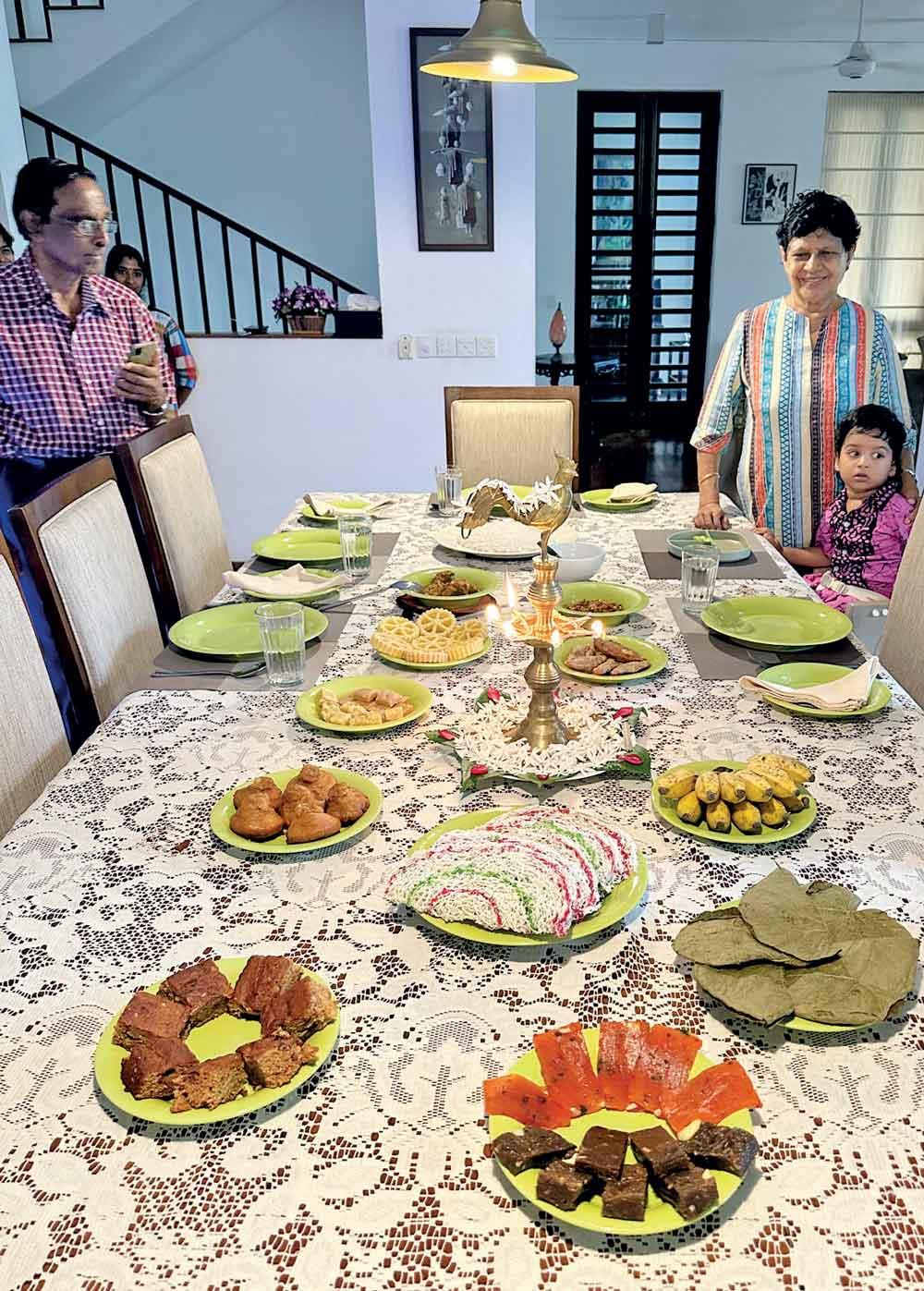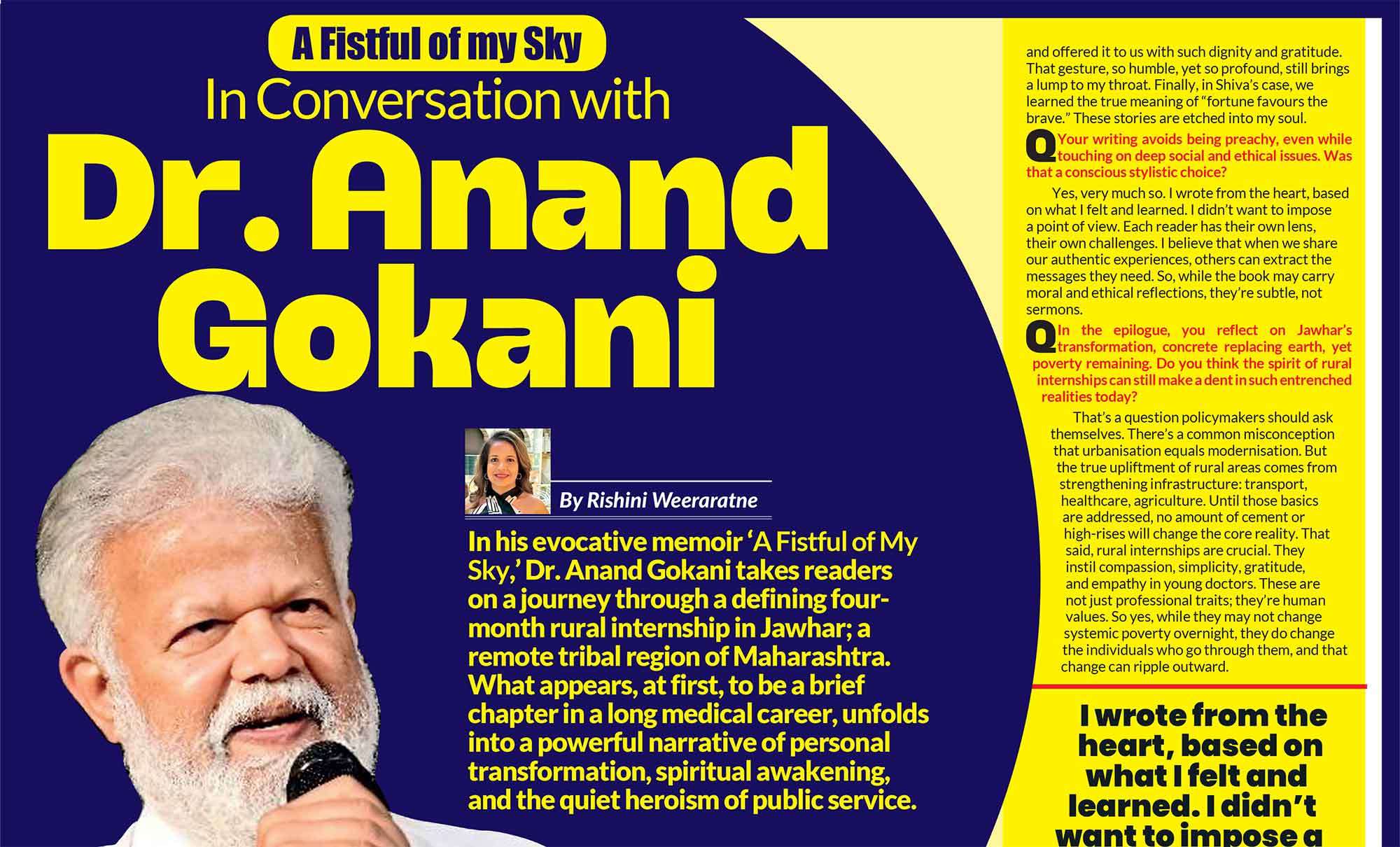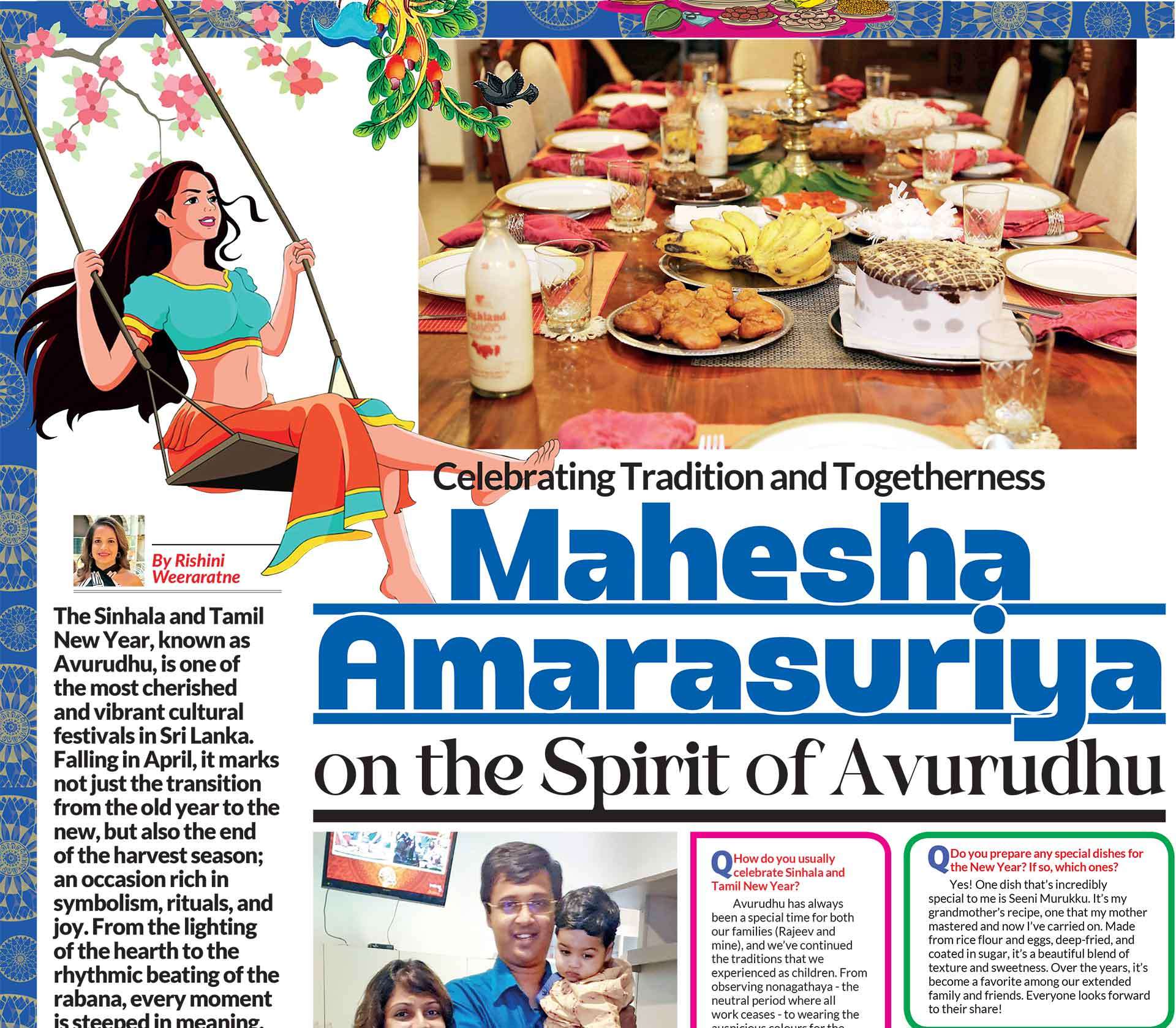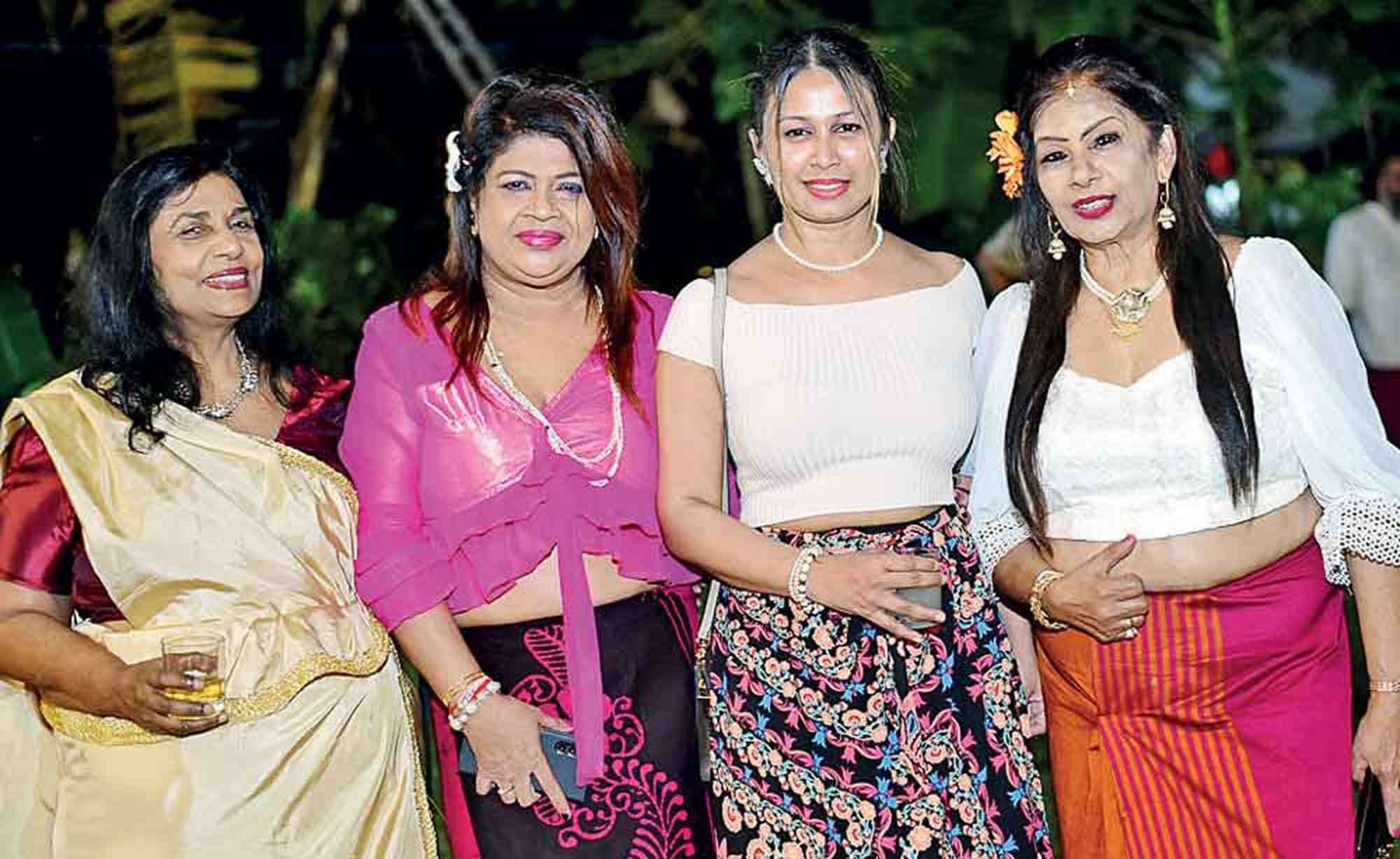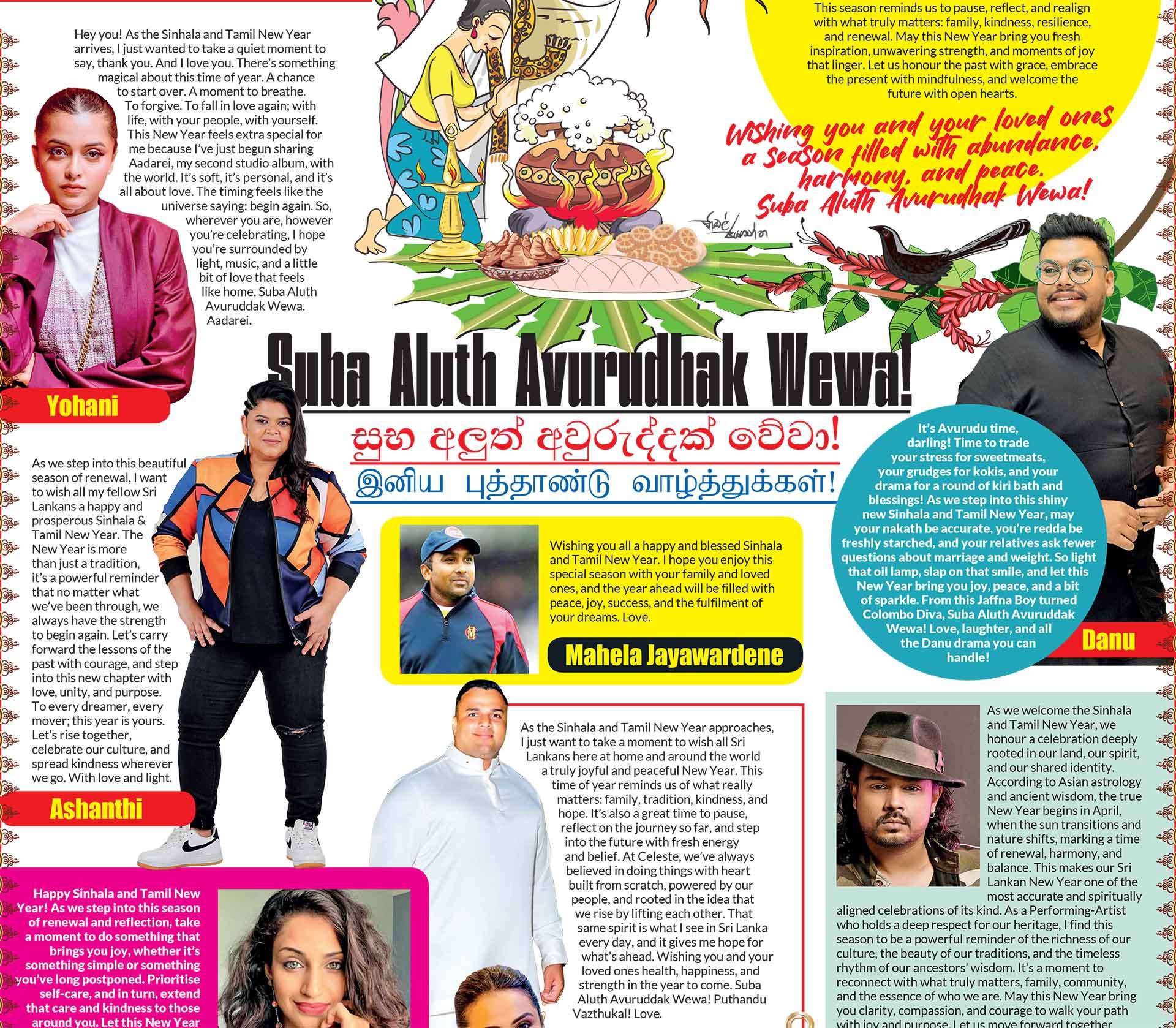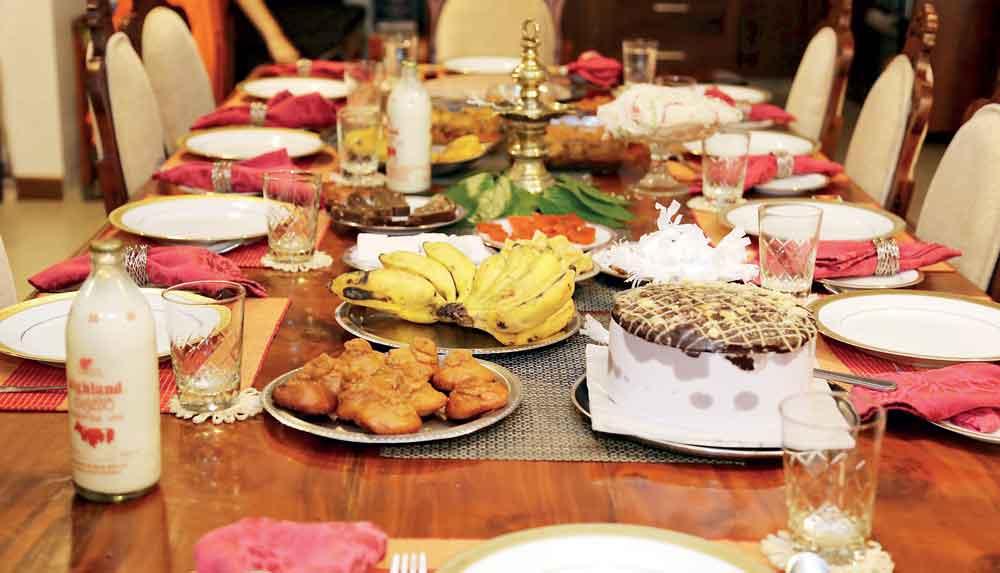
The Sinhala and Tamil New Year, known as Avurudhu, is one of the most cherished and vibrant cultural festivals in Sri Lanka. Falling in April, it marks not just the transition from the old year to the new, but also the end of the harvest season; an occasion rich in symbolism, rituals, and joy. From the lighting of the hearth to the rhythmic beating of the rabana, every moment is steeped in meaning. Families gather to honour age-old customs, prepare delicious traditional sweetmeats, and reconnect with their roots. Children play Avurudhu games in gardens, elders bless the young, and homes echo with laughter and music. In a world that’s moving rapidly towards the modern, Avurudhu remains a time of pause, reflection, and reconnection. In this spirit of nostalgia and celebration, we speak to Mahesha Amarasuriya, Director, Mastercard, Sri Lanka, who shares her beautiful memories, family traditions, and the values she hopes to pass on through the generations.
Q How do you usually celebrate Sinhala and Tamil New Year?
Avurudhu has always been a special time for both our families (Rajeev and mine), and we’ve continued the traditions that we experienced as children. From observing nonagathaya - the neutral period where all work ceases - to wearing the auspicious colours for the year, lighting the hearth, and boiling milk, every ritual holds meaning. We prepare our first meal and eat together at the designated auspicious time. These are the moments that ground us and keep our heritage alive.
Q What are some traditions that your family follows during the New Year?
Beyond the key rituals, we always make time to visit our parents and have them visit us. There’s a lovely exchange of gifts, and it’s a time of open doors, friends and extended family drop in, and we enjoy the joy of community. Avurudhu is a time to reconnect, and that’s what we value most.
Q Who introduced you to these traditions, and have you passed them on to others?
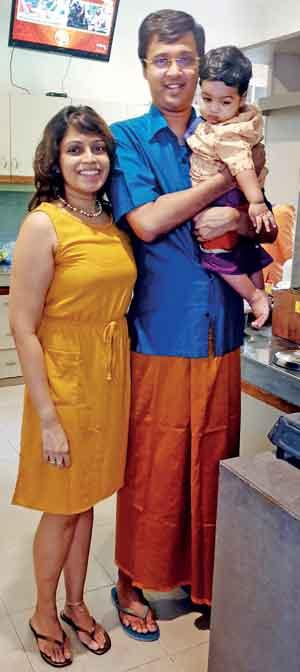 These customs have been passed down through generations. As a child, I remember following them faithfully, and now as a parent, I try to ensure our son experiences them too. There was a time when we would travel during the New Year holidays, both locally and internationally. But after our son was born, we made a conscious decision to stay home for Avurudhu, so he could observe and learn these traditions first-hand.
These customs have been passed down through generations. As a child, I remember following them faithfully, and now as a parent, I try to ensure our son experiences them too. There was a time when we would travel during the New Year holidays, both locally and internationally. But after our son was born, we made a conscious decision to stay home for Avurudhu, so he could observe and learn these traditions first-hand.
Q Do you prepare any special dishes for the New Year? If so, which ones?
Yes! One dish that’s incredibly special to me is Seeni Murukku. It’s my grandmother’s recipe, one that my mother mastered and now I’ve carried on. Made from rice flour and eggs, deep-fried, and coated in sugar, it’s a beautiful blend of texture and sweetness. Over the years, it’s become a favorite among our extended family and friends. Everyone looks forward to their share!
Q What is your favorite sweet treat to enjoy during the New Year celebrations?
Aside from Seeni Murukku, I’d have to say Aasmi, Kokis, Milk Toffee, and Musket. Each sweet has its own unique flavour and significance. There’s something deeply comforting and nostalgic about biting into a piece of Kokis or Milk Toffee that reminds you of being a child during Avurudhu.
Q Are there any childhood memories of New Year celebrations that stand out to you?
Definitely! One memory that stands out is playing Avurudhu games with other kids in the neighbourhood. It was such a communal experience, we’d gather outdoors for games like Kana Mutti Bindeema, and there was such a sense of excitement in the air. I also vividly remember how all the sweetmeats were made at home. My grandmother and mother would spend days preparing Kevum, Kokis, Mung Kevum, Milk Toffee, Coconut Toffee, and of course, Seeni Murukku. I loved helping out, but I loved sneaking bites of the leftover Milk Toffee mixture even more!
Q What does Sinhala and Tamil New Year mean to you personally?
To me, Avurudhu is a celebration of culture, family, and gratitude. It’s a time to pause, reflect, and start anew with positivity. It marks the end of the harvest season, which is significant in itself, but it’s also a time of new beginnings, full of blessings, good wishes, and of course, sweets! It’s a period of joy for the entire family, especially children, who get to experience love, generosity, and the joy of togetherness through rituals, gifts, and family visits.
To me, Avurudhu is a celebration of culture, family, and gratitude. It’s a time to pause, reflect, and start anew with positivity
Q How do you ensure your child connects with these traditions in today’s digital age?
We try to include him in everything, from waking up early to dress in traditional attire, to helping out in small ways with food preparations or setting up for rituals. Children absorb so much from what they see. While it may not always be practical to do everything exactly as our grandparents did, the essence of the rituals, the symbolism behind boiling milk, for example, as a sign of prosperity; is explained to him. It’s about planting those seeds of understanding and appreciation.
Q What advice would you give to younger generations about keeping traditions alive?
I’d say embrace the traditions, even in small ways. You don’t have to do everything perfectly or exactly as it was done generations ago. What matters is understanding the meaning behind the customs and taking the time to celebrate. These traditions connect us to our roots, our families, and our sense of identity. Even if it’s just lighting the hearth or making one sweet dish, those moments are worth cherishing and passing on.
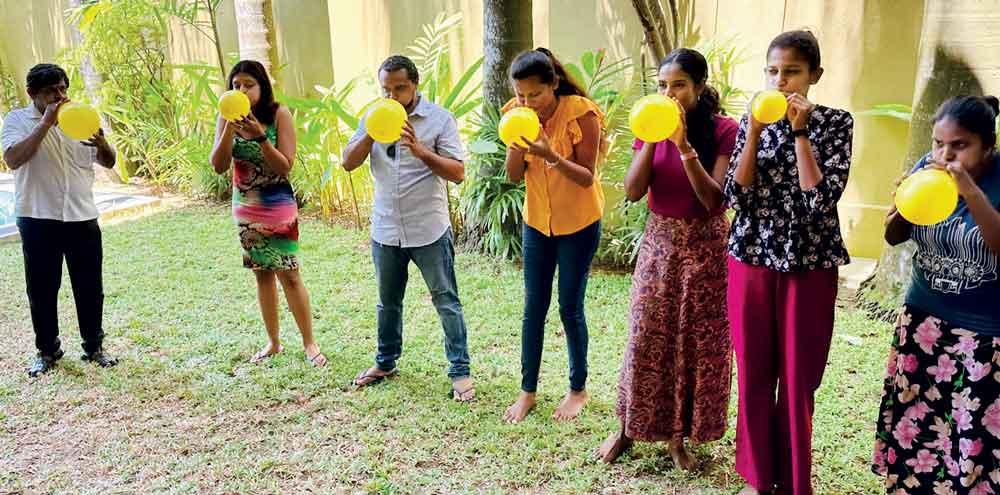
Q What would your ideal Avurudhu day look like?
An ideal Avurudhu day for me begins early, with the house smelling of freshly prepared sweetmeats and the sound of traditional music in the background. We’d all wear our Avurudhu colours, light the hearth at the designated time, and boil milk. Then we’d have our first meal together, visit our parents, exchange gifts, and host friends and family for a joyful gathering. Add a few rounds of Avurudhu games and a full table of treats, and that’s my perfect New Year’s Day.
Q Do you take part in any New Year games or cultural activities? If so, which ones?
Yes, we do! Within our immediate family gatherings, especially when children are around, we include classic Avurudhu games. Kana Mutti Bindeema (breaking pots), the lime and spoon race, and Aliyata Ehe Thabeema (pin the eye on the elephant) are favourites. The laughter, competition, and joy during these games make for unforgettable memories and bring the whole family together.
Q Has the way you celebrate Avurudhu changed over the years?
Yes, quite a bit. When we were younger, celebrations were more communal and extended. Now, due to busy schedules and urban lifestyles, things are more concise. However, the heart of the celebration, the rituals, the sweetmeats, the family time, remains intact. We’ve simply adapted to modern life without losing the essence of the celebration.
One dish that’s incredibly special to me is Seeni Murukku. It’s my grandmother’s recipe, one that my mother mastered and now I’ve carried on
Q How do you balance traditional customs with modern ways of celebrating?
I think traditions naturally evolve. What we follow today might look slightly different from what our grandparents practiced, but the essence remains. For instance, some sweets are hard to make at home now, so we buy them. And with busy work schedules, New Year celebrations often get condensed into just the holidays. But we try to preserve what we can; keeping it simple yet meaningful.
Q Finally, what’s your wish for this Avurudhu season?
I wish for peace, joy, and renewed hope for everyone. May this New Year bring health, happiness, and prosperity to all. And may we continue to honour our culture and traditions while creating new memories with those we love.
